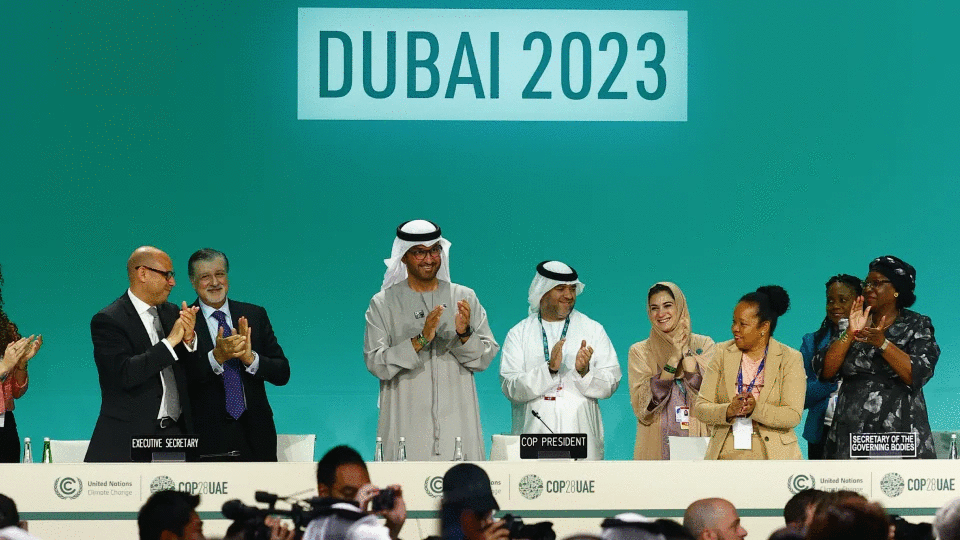No phase-out of fossil fuels was on offer despite the strong call that is in line with climate emergency whereas the “Loss and Damage” fund has won its place as it’s become operationalised with a startup pledge worth over US $700 million
The UN Climate Change Conference, COP28, was wrapped in Dubai, UAE, on Wednesday with mixed responses from the delegates and observers. The two-week-long negotiations ran over time, almost 23 hours later than the schedule set on Tuesday, as they became intense overnight on whether the outcome would include a call to “phase down” or “phase out” planet-heating fossil fuels like oil, gas and coal, according to UN News.
The negotiations eventually saw an endorsement of the first Global Stocktake aimed at assessing climate action progress and adoption of the final negotiation text, UAE Consensus, delivered at a fast pace that left some delegates frustrated.
According to the UNFCCC, the global stocktake recognizes the science indicating that GHG emissions need to be cut by 43% by 2030 compared to 2019 levels to limit global warming to 1.5C. It notes that countries are off track when it comes to meeting their Paris Agreement goals.
The stocktake addresses accelerating efforts towards the “phase-down” of “unabated” coal power, “phasing out inefficient fossil fuel subsidies”, and other measures that drive “the transition away from fossil fuels”.
In the short term, countries are encouraged to come forward with ambitious and economy-wide emission reduction targets, covering all greenhouse gases and aligned with the 1.5C limit in the next round of climate action plans or NDCs by 2025. The stocktake also calls on them to take action towards achieving a tripling of renewable energy capacity and doubling energy efficiency improvements by 2030.
The final text, however, adopted merely “transitioning” away from fossil fuels and “tripling” renewable energy capacity and “doubling” energy efficiency by 2030.
“The world needed to find a new way. By following our North Star, we have found that path,” said COP28 President, Dr. Sultan Al Jaber during his closing speech. “It is a balanced plan that tackles emissions, bridges the gap on adaptation, reimagines global finance and delivers on loss and damage. It is built on common ground. It is strengthened by inclusivity and it is reinforced by collaboration. It is an enhanced, balanced, but make no mistake, historic package to accelerate climate action.”
The other side of the coin
As reported by the Guardian, countries from the global south and climate justice advocates said the text fell short of what was needed on emissions reductions and finance, while including language that appeared to “placate” fossil fuel interests.
There was also some frustration rising shortly after the adoption of the text. The lead negotiator for the Alliance of Small Island States (AOSIS) Anne Rasmussen from Samoa reportedly pointed out that the decision was gavelled during the group’s absence in the plenary room as it was still coordinating its response to the text.
The Guardian reported that she did not formally object to the agreement and believed the deal had good elements, but said “the process has failed us” and the text included a “litany of loopholes”.
“We have made an incremental advancement over business as usual when what we really needed is an exponential step change in our actions and support,” she was quoted as saying during her speech that received a standing ovation.
Several scientists interviewed by the Guardian also voiced their disappointments, with some citing that the deal over fossil fuels is “dangerous”, “ devastating”, and “a tragedy to the planet and the future”. (Read: Failure of Cop28 on fossil fuel phase-out is ‘devastating’, say scientists)
UN chief António Guterres said that mention of the world’s leading contributor to climate change comes after many years, in which the discussion of this issue was blocked. However, he stressed that the era of fossil fuels must end with justice and equity. He said limiting global heating to 1.5C will be impossible without the phase-out of all fossil fuels and this is being recognized by a growing and diverse coalition of countries.
“To those who opposed a clear reference to a phase-out of fossil fuels in the COP28 text, I want to say that a fossil fuel phase-out is inevitable whether they like it or not. Let’s hope it doesn’t come too late,” the UN Secretary-General remarked.
UNFCCC’s Executive Secretary Simon Stiell said “genuine strides forward” were made at COP28, but the initiatives announced in Dubai are “a climate action lifeline, not a finish line.” Mr. Stiell said the Global Stocktake had clearly revealed that progress is not fast enough, although it is “undeniably” gathering pace. The current trajectory, he added, is just under three degrees of global warming equating to “mass human suffering”.
Mr. Stiell told reporters outside the main hall afterwards that COP28 needed to signal a hard stop to humanity’s core climate problem_fossil fuels and their planet burning pollution, the UN News reported.
“While we didn’t fully turn the page on the fossil fuel here in Dubai, this is clearly the beginning of the end. This agreement is an ambitious floor, not a ceiling. So, the crucial years ahead must keep ramping up ambition and climate action,” the UN climate chief said.
The negotiations also agreed on the loss and damage agenda with the UN’s disaster reduction-related offices hosting the secretariat of the Santiago Network for Loss and Damage to catalyze technical assistance to developing countries that are particularly vulnerable to the adverse effects of climate change.
They also agreed on targets for the Global Goal on Adaptation (GGA) and its framework, which identify where the world needs to get to to be resilient to the impacts of a changing climate and to assess countries’ efforts, according to the UNFCCC.
On the climate finance front, despite the massive pledge, they are far short of the trillions eventually needed to support developing countries with clean energy transitions and implementing their national climate plans and adaptation efforts. To deliver such funding, the global stocktake underscores the importance of reforming the multilateral financial architecture and accelerating the ongoing establishment of new and innovative sources of finance, the UNFCCC noted.
The UNFCCC said discussions at COP28 continued on setting a “new collective quantified goal on climate finance” in 2024, taking into account the needs and priorities of developing countries. The new goal, which will start from a baseline of US $100 billion per year, will be a building block for the design and subsequent implementation of national climate plans that need to be delivered by 2025.
COP29 will be held in Azerbaijan next November.
Also read: Carbon Brief’s key takeaways/ COP28: Key outcomes agreed at the UN climate talks in Dubai
Sources: UNFCCC/ COP28 UAE/ UN News/ The Guardian/ Carbon Brief
Indie • in-depth online news agency
to “bridge the gap” and “connect the dots” with critical and constructive minds on development and environmental policies in Thailand and the Mekong region; to deliver meaningful messages and create the big picture critical to public understanding and decision-making, thus truly being the public’s critical voice


